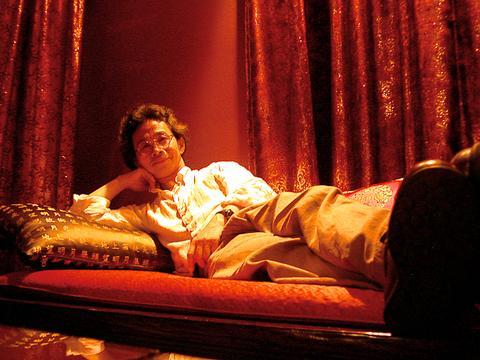Gary Chen (
Twenty years ago he opened a bar in the Combat Zone called Woodstock, which he transformed into Brown Sugar, a relatively legendary jazz spot in Taipei's ephemeral nightclub scene.

PHOTO: JULES QUARTLY, TAIPEI TIMES
Now, in between opening and closing two Roxy's and one Buffalo Town, setting up TU on Fuhsing South Road and relocating Brown Sugar to a spanking new address in the Warner Village area, he has reopened Woodstock where the old Brown Sugar was. Business couldn't be better, even if Chen does find himself where he started out.
Chen is looking over the bar on Wednesday, around 10:30pm, checking that preparations for the opening night, tonight, are in hand.
The new Woodstock sign has already been put up, illuminating the wood cabin exterior of the club. Stepping inside through a sliding doors, the dominant colors seems to be muted grays and blacks. There is a moderately-sized dance area and a stainless steel bar.
Then, a range of colors toward the red-end of the spectrum hits you. There are exotic drapes embroidered with glitter, soft seating and intimate spaces, set off by curtained private rooms featuring lounging couches and cushions. Chen says the interior of the new Woodstock is "like a hilarious lounge" -- and he's not wrong.
He poses for photograph on a Mandarin-style couch and discusses the various businesses he is involved in, his partners in Brown Sugar Group -- "Great, just great" -- and tells a few stories from his 20 years or so in the capital city's entertainment industry. His main preoccupation is, however, he says, collecting Song and Ming dynasty porcelain. "You know, property is so expensive."
Asked why he is reopening Woodstock, Chen says it is the right time. "Disco's come back and now I'm going back. We played really good music. The style was rock n' roll. There were a lot of foreigners and locals too. They all came, it was very international."
The new Woodstock, he says, will be more of the same, but with the lounge format that has become ubiquitous. He will once again take to the decks and play what he calls the best music of the last 50 years, in tandem with DJ Dark (mixed styles) and local techno alternative hero DJ Alan.
Clearly, Chen is attempting to cover all the musical bases with his new bar and has one eye on his Chinshan South Road neighbor and former business partner in previous incarnations of Roxy 99, Lin Wei, who has been packing them in regularly for the past four years.
"I like Roxy. I told Lin Wei that it will be the most fun this way. More people will come to the south side of the city and that could mean up to 3,000 or 5,000 people around here every night."
Tonight will be a case of deja vu for Chen, and to celebrate, he will be offering free fruit punch at the club's relaunch.
Woodstock opens 7pm to 5am, seven days a week, and serves Western-style food. It is located at 218, Chinshan South Road, Sec 2, Taipei (

June 23 to June 29 After capturing the walled city of Hsinchu on June 22, 1895, the Japanese hoped to quickly push south and seize control of Taiwan’s entire west coast — but their advance was stalled for more than a month. Not only did local Hakka fighters continue to cause them headaches, resistance forces even attempted to retake the city three times. “We had planned to occupy Anping (Tainan) and Takao (Kaohsiung) as soon as possible, but ever since we took Hsinchu, nearby bandits proclaiming to be ‘righteous people’ (義民) have been destroying train tracks and electrical cables, and gathering in villages

Swooping low over the banks of a Nile River tributary, an aid flight run by retired American military officers released a stream of food-stuffed sacks over a town emptied by fighting in South Sudan, a country wracked by conflict. Last week’s air drop was the latest in a controversial development — private contracting firms led by former US intelligence officers and military veterans delivering aid to some of the world’s deadliest conflict zones, in operations organized with governments that are combatants in the conflicts. The moves are roiling the global aid community, which warns of a more militarized, politicized and profit-seeking trend

The wide-screen spectacle of Formula One gets a gleaming, rip-roaring workout in Joseph Kosinski’s F1, a fine-tuned machine of a movie that, in its most riveting racing scenes, approaches a kind of high-speed splendor. Kosinski, who last endeavored to put moviegoers in the seat of a fighter jet in Top Gun: Maverick, has moved to the open cockpits of Formula One with much the same affection, if not outright need, for speed. A lot of the same team is back. Jerry Bruckheimer produces. Ehren Kruger, a co-writer on Maverick, takes sole credit here. Hans Zimmer, a co-composer previously, supplies the thumping

Dr. Y. Tony Yang, Associate Dean of Health Policy and Population Science at George Washington University, argued last week in a piece for the Taipei Times about former president Ma Ying-jeou (馬英九) leading a student delegation to the People’s Republic of China (PRC) that, “The real question is not whether Ma’s visit helps or hurts Taiwan — it is why Taiwan lacks a sophisticated, multi-track approach to one of the most complex geopolitical relationships in the world” (“Ma’s Visit, DPP’s Blind Spot,” June 18, page 8). Yang contends that the Democratic Progressive Party (DPP) has a blind spot: “By treating any